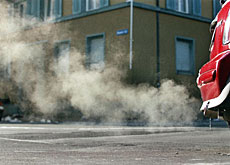Tax on greenhouse gases looms

As the Kyoto Protocol comes into force, Switzerland is still not sure how to reach its targets for reducing greenhouse-gas emissions.
The government is considering different options to encourage or coerce citizens and the economy into cutting carbon-dioxide pollution.
The Kyoto Protocol on greenhouse-gas emissions took effect on Wednesday. Switzerland is one of 141 nations – representing over 60 per cent of global emissions – that have ratified or acceded to the treaty.
Blaming global warming on the presence of too much of these greenhouse gases, the protocol aims to slow the worldwide temperature increase.
Under its provisions, the Swiss have promised to bring their own greenhouse-gas pollution eight per cent below 1990 levels. Legislation voted by parliament in 1999 sets out how this target should be met.
As part of its commitment to Kyoto, Switzerland’s so-called CO2 law demands that carbon-dioxide emissions from fossil fuels be cut by ten per cent.
Heating-fuel pollution must be slashed by 15 per cent, while the target for motor fuels has been set at minus eight per cent.
Incentives
“Parliament wanted specific targets in order to avoid one sector being responsible for meeting the overall reduction goal,” said Andrea Burkhardt of the Swiss environment agency.
“Targets for the transport sector are less popular and it’s harder to implement measures.”
The main pillar of the legislation is based on voluntary measures, a philosophy that has met with some success.
“Industry and small- and medium-sized companies have committed themselves to cutting emissions,” Burkhardt told swissinfo. “Of course, many of them were motivated by the threat of a CO2 tax since they can now apply for fiscal exemptions.”
According to the environment agency, voluntary measures have been less successful in sectors such as the building industry or the transport business.
Faced with the likelihood that Switzerland will not reach its Kyoto target, the government has decided to implement the second phase of the CO2 legislation.
“If we cannot comply with the sectorial targets, then the government has to introduce an incentive tax on fossil fuels,” added Burkhardt. “The tax rate will be set according to how far away we are from meeting our reduction goals.”
Taxing options
The authorities are considering four tax options, although no decision has yet been reached.
The first one would involve all-out taxation of fuels, pushing up prices significantly and leading to a loss in revenue of around SFr450 million ($370 million) for the federal government.
The second option would also increase fuel prices, but to a lesser extent, and part of the tax money would be used to buy emission credits abroad. These credits can be counted towards Switzerland’s emission reduction targets.
Both solutions would provide an incentive to reduce fuel use while putting up to SFr192 back into everyone’s pocket.
“The aim of an incentive tax on fossil fuels is to convince people to change their behaviour in the short term and modify their investment decisions in the medium and long term,” said Burkhardt. “This should also allow us to look beyond 2012, when the Protocol runs out.”
The third variant combines a tax on heating fuel with a one-centime levy on motor fuel, while the fourth one would only introduce the levy.
However, the government said these two solutions would not be effective in reducing greenhouse-gas emissions.
Consultation
The trade unions, environmental groups, consumer organisations and the Left have come out in favour of a CO2 tax, demanding its immediate introduction.
Their claim has been backed by climate specialists, including some belonging to the government’s own panel on climate change.
The researchers warn that the effects of today’s human activity will linger for centuries, and that record CO2 levels must be stabilised now by cutting emissions by up to 70 per cent.
Scientists such as Eberhard Jochem of Zurich’s Federal Institute of Technology add that there are also economic benefits to be reaped from a new tax.
“It would increase Switzerland’s gross domestic product by one per cent,” he said recently. “It’s not huge, but it would be positive.”
Not everyone is so enthusiastic about the proposed tax. The Swiss Business Federation, economiesuisse, would rather see the one-centime levy applied, a position backed by the petrol importers’ association and part of the political Right.
But many companies have already taken measures to cut CO2 output, and support the tax. The chemical industry association has warned that its members that have taken voluntary measures would be disadvantaged if a tax was not introduced.
Switzerland’s two biggest retailers, Migros and Coop, also support the CO2 tax, albeit in a more moderate form, as they fear their lucrative petrol companies could lose business.
swissinfo, Scott Capper
To fulfil its Kyoto requirements, Switzerland adopted its CO2 law in 1999.
It calls for an overall reduction of CO2 emissions from fossil fuels to ten per cent below 1990 levels.
Carbon dioxide accounts for 80 per cent of Swiss emissions.
Switzerland produced 7.3 tons of CO2 per capita in 2002, versus 19.8 in the US and 9.6 in Britain.
The 1997 Kyoto Protocol is an addition to the 1992 United Nations Framework Convention on Climate Change treaty.
Switzerland ratified the Protocol, which calls for greenhouse-emission reductions, in 2003.
It comes into effect 90 days after Russia signed on.
Besides carbon dioxide (CO2), it calls for reductions of methane, nitrous oxide, hydrofluorocarbon, perfluorocarbon and sulphur hexafluoride emissions.

In compliance with the JTI standards
More: SWI swissinfo.ch certified by the Journalism Trust Initiative



You can find an overview of ongoing debates with our journalists here. Please join us!
If you want to start a conversation about a topic raised in this article or want to report factual errors, email us at english@swissinfo.ch.